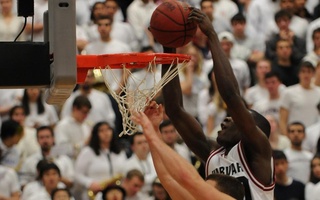
Co-captain Keith Wright and the Harvard men’s basketball team will play in the NCAA Tournament next weekend.
Although his tenacity on the court says otherwise, there is a soft side to Keith Wright. Just ask the 6’8” senior forward and co-captain of the Harvard men’s basketball team about his mother.
“I’m a mama’s boy, and I’ll admit it,” Wright says. “I’m not ashamed of it.”
If you have attended a Crimson basketball game, chances are high that you’ve seen the object of Wright’s affection, Sabrena Tabron. Tabron, who divorced Wright’s father when Keith was in the second grade, has been in the stands for all but a handful of her son’s games. This year alone she has attended all but the Nov. 19 game at Loyola Marymount and the Jan. 10 game against Monmouth.
Clearly, Tabron is far from the casual fan. She spends most of the games on her feet, reminding the team to keep their hands up on defense and yelling at them to make that extra pass. Occasionally, Tabron will hold up signs to encourage her son and his teammates. She is a cross between super-fan, sideline coach, and mother.
Tabron’s sign from the Feb. 24 game against Princeton, which read, “I’m Keith Wright’s mom,” indicates which of the three roles she considers most important. This is even clearer when she tells the story of how she and Keith arrived at Harvard.
In some ways, this family journey began years before Keith’s birth, when Tabron could be found on basketball courts in California. Tabron, who played forward like her son, competed at the high school and collegiate level. She played at San Francisco State for a year, where she led the conference in blocked shots as a freshman. She followed that up with two years at California Baptist University. Keith wears number forty-four in her honor.
And Tabron learned much more from her basketball career than a couple on-the-court tips to pass along to her son.
“Basically, basketball always defined who I was, and therefore when it came to college, I didn’t have the stamina to balance education along with sports,” she explains. “So, in raising my children, I had decided that sports would never define them. I always played sports, and it was always basketball, basketball, basketball from the time I was six. So [I decided that] when I had kids, I wouldn’t allow them to play basketball and not focus on their education.”
True to her word, Tabron made sure that education came first in her household.
Keith, his younger sister, and his mother lived in California until 2001, when Tabron decided to relocate her children to the East Coast.
“I chose to leave San Francisco back in 2001 when I wanted to provide my kids with a better life, with a better public school education,” Tabron says. “So I did a little research and found that Princess Anne High School in Virginia Beach was then one of the top 10 schools in the country for their IB program. So I packed up my family and moved cross-country without a job, without a house, and without family.”
Unlike most collegiate basketball players, Wright did not play organized basketball as a child.
But as he transitioned from middle to high school, Wright’s interest in basketball grew. He tried to play during his freshman year of high school—until he called his mother from try-outs to tell her about his interim report card. When Wright informed his mother of the one C on his mid-year grades, she prohibited him from trying out for the team. Tabron says she wanted to teach her son that basketball is a privilege.
Wright obeyed his mother’s wishes and did not play that season.
A year later, Wright told his mother that he wanted to play basketball, in high school and in college. And since his grades met her high standards, Tabron let Keith play.
Read more in Sports
Men's Hockey To Meet Rival Yale in PlayoffsRecommended Articles
-
 Crimson Relies On Sixth Man
Crimson Relies On Sixth Man -
 Potential Recruits Head to Lavietes for Basketball Camp
Potential Recruits Head to Lavietes for Basketball Camp -
 Even in NBA, Jeremy Lin to Win for Harvard?
Even in NBA, Jeremy Lin to Win for Harvard? -
 Court Marshals
Court Marshals -
Amaker Discusses Plan for New Basketball ArenaLavietes Pavilion has been around since the Roaring Twenties, but Harvard basketball fans may soon be roaring in a brand new arena.
-
New Years Resolutions Suggestions for Hockey, Basketball TeamsWell, we made it. The world didn’t end (even though Harvard men’s basketball fans might feel like it did), and ...













